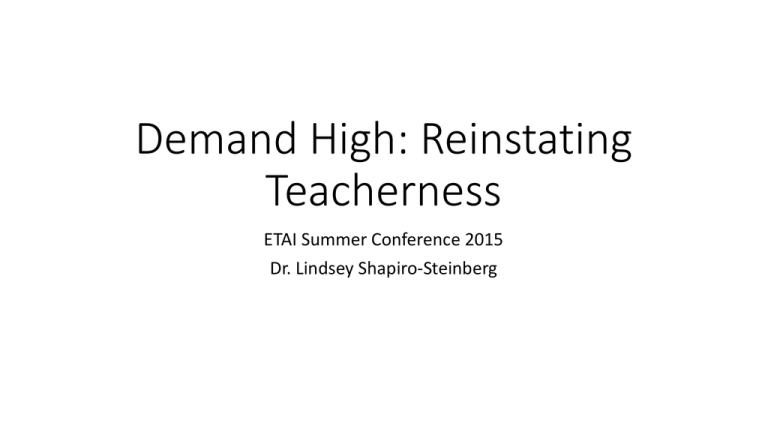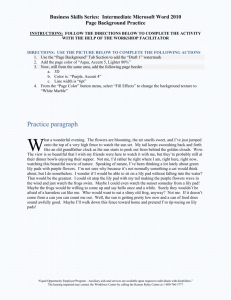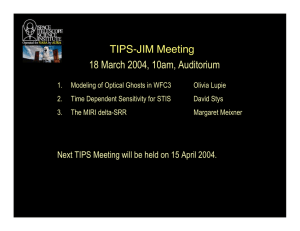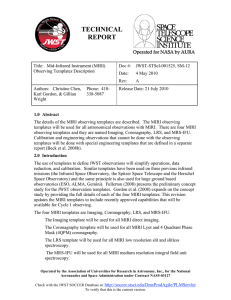Demanding High in ELT
advertisement

Demand High: Reinstating Teacherness ETAI Summer Conference 2015 Dr. Lindsey Shapiro-Steinberg My talk : • Popular trends in ELT • Suggest that some of those trends have taken the teaching out of the learning experience • Reinstate the teacher • Look at ways we can challenge our students more a) making learning more memorable b) activating the working memory The role of memory on learning Having a good memory is a key component in language aptitude. (P. Skehan, 1998) “Speakers do as much remembering as they do putting together” (D. Bolinger, 1961) “grammaticised lexis” (M. Lewis, 1998) Popular Trends in EFL Task-based learning Communicative Approach How much of this do you do? How do you feel about doing it or not doing it? Asking you to turn to the person sitting next to you is part of the TBL and CLL paradigm. But, honestly, how many of you really wanted to do that? The Teacher! Because you came to hear me. What would you say if we made this session all about the teacher? Not very fashionable? Why am I interested in this? Challenging our current practice 1. Is there really challenging learning going on in my classroom? 2. Could my students be doing more ? 3. Where is the teaching? 4. Has my teaching become ritualistic? 5. Where is the tangible upgrade in what the students are NOW able to do as they leave my class? Jim Scrivener Adrian Underhill Vygotsky: The zone of proximal development How much of this help can I really get from my peers? Do my peers speak better than me? Can they correct me? Can they enhance my language abilities ? A question for today Instead of just being a provider of learning opportunities over which I don’t really have any control Can I be a provider of learning opportunities in which I can actually make sure that every learner experiences an upgrade? Perhaps I should stop being a facilitator? And actually become a … TEACHER!!! The questions are then… What techniques can I use that will get everyone engaged? And how can we do this with very little teacher time expenditure? All it needs is a tweak. A slight adjustment. 3 main areas of exploration: 1. Expecting more 2. Eliciting more engagement 3. Learning to see learning Typical Exercise Complete the sentences with the correct form of the adjective. 1. All her life, Lily has been ________ than her sister, Miri. (luck) 2. Miri, on the other hand, always did _____________than Lily in school. (good) 3. For example , Miri’s grades were always ____________ than Lily’s. (high) 4. Both sisters are pretty, but many believe Lily to be ____________. (pretty) 5. They both have good jobs but Lily’s work is ______________ (interesting) than Miri’s. She gets to travel a lot. 6. Despite these differences, Miri thinks that she is _______________ than Lily. (happy) Getting behind the answer All her life, Lily has been ________ than her sister, Miri. (luck) Paralinguistics 2. Miri, on the other hand, always did _____________than Lily in school. (good) Memory: In your mind’s ear 3. For example , Miri’s grades were always ____________ than Lily’s. (high) 3. For example , Miri’s grades were always ____________ than Lily’s. (high) Playing with grammar and lexis 5. They both have good jobs but Lily’s work is ______________ (interesting) than Miri’s. She gets to travel a lot. So, what did we do? •Getting behind the text •Paralinguistics •Hearing in the mind’s ear •Playing with grammar and lexis Typical Exercise 2 1. Quick! Catch the baby. I think she _______________ to roll off the bed! 2. Oh-oh. Look at those clouds. Looks like it _______________ to rain. 3. One day we _______________ look back at all this and laugh. 4. I predict that you ______________ meet a tall, dark and handsome stranger and that you ______________ fall in love and get married. Hello! Coffee, please! If you visit a café and the staff are rude you can choose not to go back. But what happens when it’s the customers who are impolite? A French Café has decided to reward polite customers and punish rude ones by implementing some unusual coffee price variations. According to the menu board, ‘a coffee’ costs €7 while ‘a coffee, please’ costs a more affordable €4.50. Of course, there’s an even cheaper option: ‘Hello, can I have a coffee, please?’ will cost you just €1.40. Sometimes it pays to be polite and if you are in a bad mood you can always choose another café. 1. What did a French Café decide to do? 2. How did they do this? 3. If you say, “Hello, coffee please.” what will happen? 4. Why does it pay to be polite? 5. What does the writer suggest at the end? Word pool activities FAT GRAMMAR Few words…much language A certain sentence becomes available for something new. MEMORY •Retrieval – 95% •Working memory- processing •Long-term memory- previous knowledge A Model of Memory Reading 1. Read text A2. Try to work your memory so as to store as much as you can. 2. Now read text B2 and circle the changes. 3. Get into groups. Read the sentences on the cards and complete the missing chunk based on the first letters of each word. 4. Arrange the story in order. 5. Reconstruct the story using the initialed chunks. The initialed chunks TC CWTBO OP TCALSS IITSO IBRD E and ROT CWTTR TMAD AAGD The role of memory on learning Having a good memory is a key component in language aptitude. (P. Skehan, 1998) “Speakers do as much remembering as they do putting together” (D. Bolinger, 1961) “grammaticised lexis” (M. Lewis, 1998) Making learning memorable • Simplicity • Unexpectedness • Emotions • Stories (Heath and Heath, 2008) To sum up! Techniques for eliciting more 1. 2. 3. 4. 5. Avoid rubberstamping Get behind the answer Listening to the mind’s ear Paralinguisitc features Fattening grammar Learning Moves 1. Hearing over and over in your mind’s ear 2. Thinking and rethinking 3. Thinking on the edge Perhaps we need to rethink 3 main areas: Attitude: How can we stop trying to cover lots of material and focus on the potential for deep learning? Energy focus: How can I start to think about learning moves behind what my students do? Techniques: What tweaks can I actually do to get more learning going? THANK YOU SO MUCH FOR COMING!!







